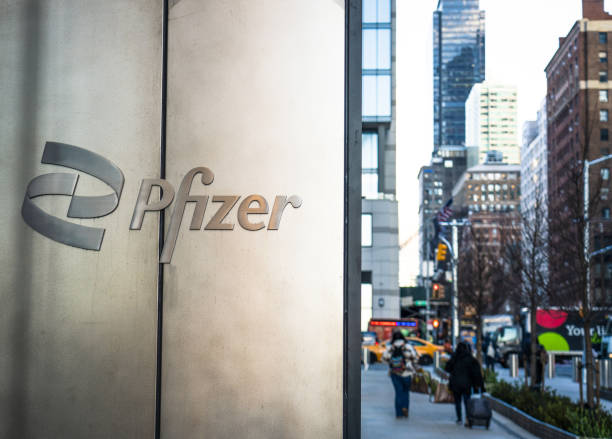In the dynamic landscape of the pharmaceutical industry, Pfizer Inc. stands out as a stalwart, known for its robust research and development pipeline and a history rich with innovative treatments and vaccines. With its stock listed under the symbol PFE, Pfizer has garnered attention not only from investors and healthcare professionals but also from the general public, especially in light of its pivotal role in developing one of the first COVID-19 vaccines. This article explores the current state of Pfizer stock, the factors influencing its performance, and what potential investors might expect in the future.
A Look at Recent Performance
As of mid-2024, Pfizer’s stock has exhibited resilience and volatility reflective of both its aggressive growth in the vaccine market and the broader pharmaceutical sector’s challenges. Following a peak in demand during the height of the COVID-19 pandemic, Pfizer’s revenue saw a significant influx, driven primarily by its vaccine sales. However, as the acute phase of the pandemic waned, so did the surge in vaccine-related revenue.
Investors closely watching Pfizer have noted a shift in focus towards sustaining growth through innovations in other drug therapies and maintaining a robust pipeline. Pfizer’s commitment to expanding its portfolio beyond COVID-19 vaccines is evident in its recent acquisitions and research endeavors, particularly in areas like oncology, rare diseases, and immunology.
Financial Health and Stock Performance
Financially, Pfizer has maintained a strong balance sheet. The company reported revenues of $81.3 billion in 2023, with a notable portion still contributed by its COVID-19 vaccine, Comirnaty, although these figures are expected to normalize as the pandemic effect subsides. Profit margins remain healthy, supported by high-margin products and cost management strategies.
Stock performance, however, has seen some fluctuations. After reaching highs in 2021 due to unprecedented vaccine sales, Pfizer’s stock has adjusted to more traditional pharmaceutical industry metrics. This adjustment reflects the market’s recalibration of expectations from pandemic-era highs to forecasts based on a broader pharmaceutical portfolio.
Dividends and Shareholder Value
Pfizer has consistently paid dividends, making it an attractive stock for income-focused investors. As of the latest fiscal year, the dividend yield stands at a competitive 3.5%, backed by the company’s strong cash flow. This commitment to returning value to shareholders enhances Pfizer’s appeal, particularly in a volatile market where steady returns are prized.
Future Outlook
Looking forward, Pfizer’s stock outlook appears cautiously optimistic. The company’s investment in research and development is robust, with a promising pipeline that includes potential treatments for cancer, Alzheimer’s disease, and other significant health challenges. Moreover, Pfizer’s strategic partnerships and acquisitions underscore its pursuit of innovation and market expansion.
The pharmaceutical giant’s ability to navigate regulatory environments and market dynamics worldwide will be critical in maintaining its market position. Investors should also monitor global health trends, such as the resurgence of infectious diseases and the rising demand for chronic disease treatments, which could influence Pfizer’s strategic directions and, consequently, its stock performance.
Conclusion
In conclusion, while Pfizer stock navigates through post-pandemic adjustments and market volatility, its underlying fundamentals, strategic growth initiatives, and leadership in the pharmaceutical industry offer a solid foundation for future growth and investor confidence. As always, investors are advised to perform their due diligence and consider their investment horizon and risk tolerance when investing in the pharmaceutical sector.
Frequently Asked Questions (FAQ) About Pfizer Stock
1. What factors are currently influencing Pfizer’s stock price?
Pfizer’s stock price is influenced by a variety of factors including revenue from vaccine sales, its broader drug pipeline development, regulatory changes, market competition, global health trends, and overall economic conditions. Investor sentiment can also shift based on Pfizer’s research outcomes, mergers and acquisitions, and financial reports.
2. How has the COVID-19 pandemic affected Pfizer’s financial performance?
During the pandemic, Pfizer experienced a significant surge in revenue, primarily due to the sales of its COVID-19 vaccine, Comirnaty. This resulted in record-breaking financial metrics in 2020 and 2021. However, as the acute phase of the pandemic has diminished, so have the exceptional revenue figures from the vaccine, although they continue to contribute substantially to the overall financial health of the company.
3. Does Pfizer pay dividends? If so, what is the yield?
Yes, Pfizer is known for paying dividends. As of the latest reports, the dividend yield stands at approximately 3.5%. Pfizer’s consistent dividend payouts are part of its appeal to income-focused investors, reflecting its stable cash flow and commitment to returning value to shareholders.
4. What does Pfizer’s drug development pipeline look like?
Pfizer’s research and development pipeline is diverse and robust, focusing on a range of therapeutic areas including oncology, rare diseases, immunology, and internal medicine. The company continues to invest heavily in developing new treatments, which includes working on vaccines, biologics, and small molecule drugs.
5. Is Pfizer stock a good buy?
Determining whether Pfizer stock is a good buy depends on individual investment goals, risk tolerance, and the portfolio context. Given Pfizer’s strong fundamentals, consistent dividends, and proactive management, it can be considered a potentially stable investment, particularly for those interested in the healthcare sector. However, potential investors should always perform their own research or consult with financial advisors to align their investments with their personal financial strategies.

